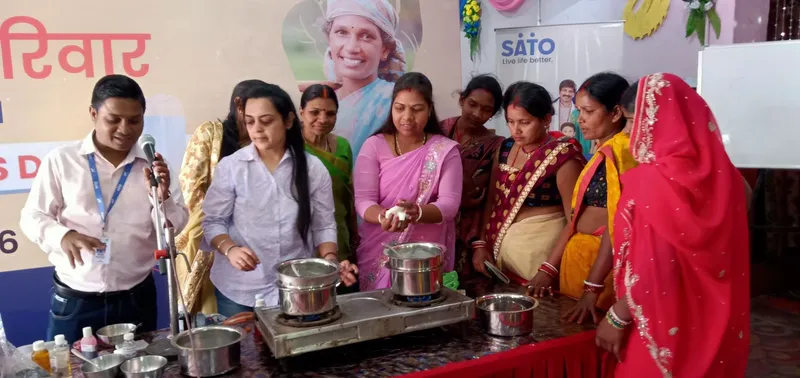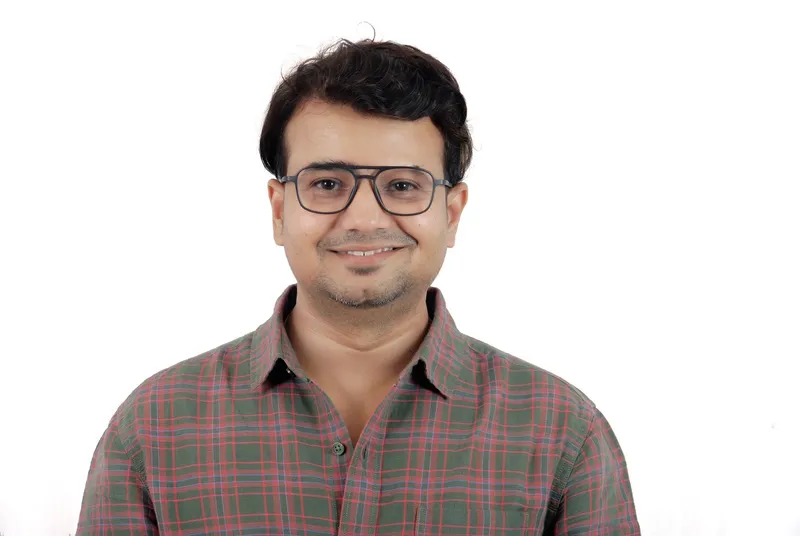10 years on, SATO continues to impact communities with affordable sanitation and hygiene solutions
As SATO, the social business of LIXIL completes 10 years, Amit Konlade, Leader, Global Supply Chain Management & Operations, takes us through the company’s innovations and its aim of impacting 100 million lives across the world.
In 2017, LIXIL , a Japanese group of companies, introduced its new tailored SATO series of toilets in Madhya Pradesh and Uttar Pradesh–a twin-pit, pour-flush latrine, easy to install, and that could be fitted by local masons. This innovative solution, which was later introduced in other states, features a self-closing trap door, which effectively reduces transmission of disease and minimises odour.
Using only a litre of water for every flush, the SATO toilet does not cost more than Rs 750 for a unit.

Soap-making workshop as part of Wash HAAT initiative
This, and a series of other products form the core of innovation at SATO, a social business aimed at providing affordable, easy-to-use products to help people from different walks of life–rural communities, schools, and frontline workers, to lead better lives.
Ten years on, SATO has positively impacted the lives of more than 35 million people across 44 countries, with the goal of improving sanitation and hygiene for 100 million consumers by 2025.
Amit Konlade, Leader, Global Supply Chain Management & Operations, SATO, admits that the pandemic derailed some of SATO’s plans in reaching out to a larger audience in terms of countries and regions, and the target of 100 million also received a minor setback.
Timely innovation
However, on the brighter side, the pandemic saw a new innovation from SATO–the SATO tap, a hygienic handwashing solution that could be used by people who did not have access to running water, and that was economical, too!
He explains, “We developed a very simple solution where used soft drink bottles are filled with water and placed on top of the SATO tap to dispense water with very little hand contact. The flow could be activated using the elbow.”
This portable device requires no installation and enables proper handwashing with as little as 100 ml of water per handwash, 90% less than its traditional counterparts. Its design allows for a variety of plastic bottles to be used as water dispenser, which otherwise would end up in landfills. The SATO Tap was named one of TIME’s Best Inventions of 2020.
With UNICEF as its development partner, it was first launched in India and later in Africa and Bangladesh.
“We committed to donating 500,000 units out of which we’ve shipped 400,000 taps so far, absolutely free of cost,” he adds.
Since 2019, Konlade says SATO has been dedicated to creating an ecosystem of affordable sanitation and hygiene products to address the needs highlighted by its social sector partners and sales teams on ground.
He elaborates, “We are looking to develop SATO Slabs, focusing on relief operations, where there is a need for toilets to be constructed in record time. Based on UNHCR guidelines, the product design has been optimised for easy transportation and make the product affordable.”
The other product being developed is a pit liner proposed as an alternative to the cement rings that are currently used to line the pits that are dug in rural areas.”
Konlade emphasises that SATO’s focus and intent lies in affordable sanitation solutions. To this, it has also added hygiene. The company runs awareness activities on its products through influencers on social media and also has a call centre arrangement through customer excellence centres through which customers can reach out and share their experiences.
SATO has also partnered with UNICEF for the ‘Make a Splash’ initiative to reach children and families in India, Tanzania, Kenya, Indonesia, and Nigeria, with access to safe, clean toilets, and hygiene solutions.
“UNICEF will help us identify the needs and urgency of requirements of solutions in these geographies as they work closely with the government and are aware of the problems on ground. Working closely with them helps us understand the market faster and serve the customers better,” Konlade says.
Impacting rural communities

Amit Kolnade
While working with social sector partners has helped SATO products reach rural communities and increase its dialogue with them, that in turn has cascaded into product design, the biggest problem faced is behavioural change.
“We could design the best products, but breaking habits of people is a big change. Also, establishing a rural supply chain is tough in a country like India because these communities are deprived of a lack of access, and there’s not enough that focuses on their requirements,” he adds.
In 2020, SATO launched the School Toilet Enhancement Program (STEP) an initiative that upgrades toilets in Tanzania, Kenya, Ethiopia, Uganda, Rwanda, Nigeria. Through STEP, it aims to reduce one of the barriers to school attendance–inadequate sanitation and hygiene facilities–which are largely preventable.
Its Wash HAAT initiative creates local influence for sanitation and hygiene in rural communities through upskilling, and awareness programmes.
So far, 36 schools have been upgraded and over 45,000 children have benefitted. It plans to launch this initiative in India soon.
“We still have 65 million lives to impact in the next two years. While it seems to be an uphill target, we are trying to focus all over initiatives and efforts into expanding our innovation pipeline to address the needs of the market,” says Konlade.
“Going forward, we would take pride in continuing to be an innovation-driven company, and are also looking at different kinds of business models to facilitate entry into more markets,” he adds.
Edited by Megha Reddy






